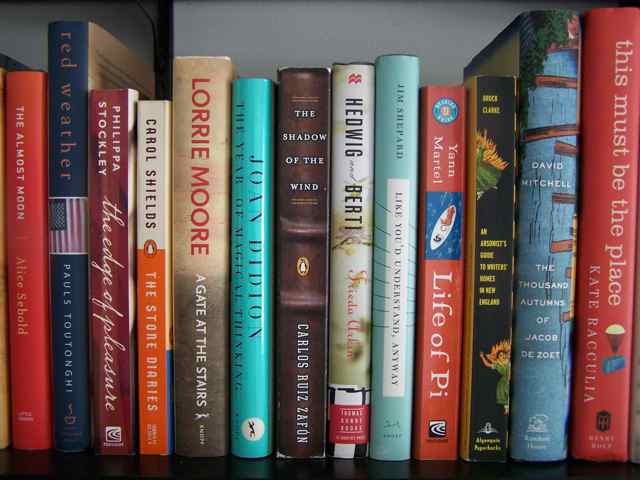 World War II and the pre- and post-war years from the perspective of women in small-town America have already been well mined for fiction, but Next to Love by Ellen Feldman evokes the time and its social upheavals more subtly than The Postmistress by Jennifer Blake, although not quite as masterfully as Baker Towers by Jennifer Haigh. Next to Love is set in the fictional western Massachusetts town of South Downs, but doesn’t have a strong sense of place. it is more of a universal story than a Massachusetts story; events similar to the ones in Next to Love were happening in small towns all across the country, and times were changing everywhere.
World War II and the pre- and post-war years from the perspective of women in small-town America have already been well mined for fiction, but Next to Love by Ellen Feldman evokes the time and its social upheavals more subtly than The Postmistress by Jennifer Blake, although not quite as masterfully as Baker Towers by Jennifer Haigh. Next to Love is set in the fictional western Massachusetts town of South Downs, but doesn’t have a strong sense of place. it is more of a universal story than a Massachusetts story; events similar to the ones in Next to Love were happening in small towns all across the country, and times were changing everywhere.
The title comes from the first epigraph in Next to Love, a quotation ascribed to a 1914 British war correspondent and lexicographer: “War … next to love, has most captured the world’s imagination.” The author doesn’t recreate battle scenes or women’s experiences overseas but imagines and describes the mostly unspoken-about psychological damage of war on soldiers and their families, in particular their wives and mothers, when husbands, sons, or close friends go into combat and come home changed or don’t come home at all.
Babe (known by this childhood nickname instead of by her given name, Bernadette) is the girl from the wrong side of the tracks with the funny last name (Dion) – the one who isn’t invited by her friends’ mothers to stay for dinner and the one whom the local librarian wouldn’t trust to check out more than one book at a time. She’s also the one whose boyfriend doesn’t propose marriage before leaving for the war while she’s bridesmaid at one friend’s rushed wedding after another before the young men of South Downs enlist or are drafted and also the only one of her circle of friends to take a wartime job. Having fallen in love with Claude Higgins, a local boy, Babe thinks, after traveling to meet him in North Carolina for a last-minute marriage before he ships out, that if it weren’t for the war he might never have crossed the class barrier and braved his parents’ disapproval to marry her, despite her intelligence and long legs.
Over the years during and after the war, she and her two childhood friends, Millie and Grace, remain loyal to each other, shedding some prejudices and overlooking others, trying to be good wives, mothers, and friends without losing too much of themselves. Here’s Babe, reflecting on their friendship, close to the end of the book:
They love one another with an atavistic ferocity, though, it occurs to Babe sitting in the sunporch, these days perhaps they do not much like one another. But she is asking too much of them. Friendship, like marriage, is not all of a piece. Sometimes she thinks she would kill for them. Sometimes she wants to kill them.
This novel would make a good book discussion book, touching as it does on issues of racial discrimination, anti-Semitism, feminism, and other topics on which there was a seismic cultural shift during the post-war decades. Next to Love is a bit too dark to be called women’s fiction – Babe’s outsider’s perspective and fettered intellect reminded me at times of Elizabeth Strout’s character Olive Kitteridge – but readers who enjoyed Laurie Graham’s book The Future Homemakers of America (as I did) or Baker Towers will probably like Next to Love.
Next to Love
Feldman, Ellen
Spiegel & Grau
Trade Paperback pub date: May 15, 2012
978-0-8129-8241-1
320 pp.
$15.00
Disclosure: I received an advance reader’s copy of Next to Love from Spiegel & Grau, an imprint of Random House through the LibraryThing Early Reviewers‘ program.
Other opinions on Next to Love (mostly good):
Fluidity of Time
Man of la Book
nomadreader
So Obsessed With
